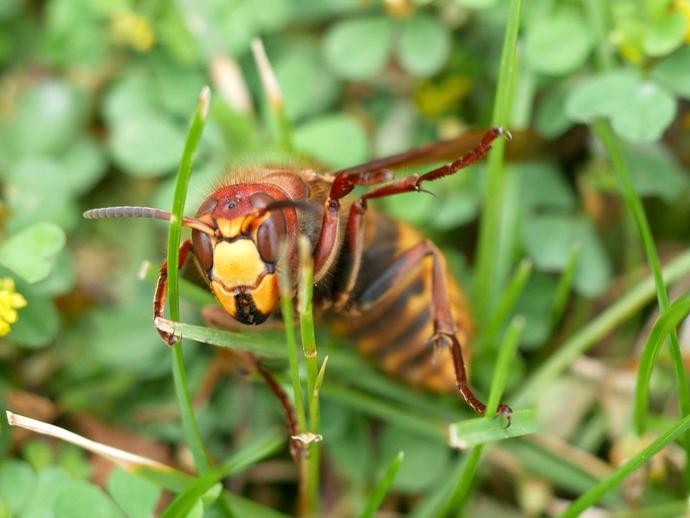May 27, 2020
The European hornet (Vespa crabro) is one of the larger hornets that you're likely to find in Virginia, and I'd wager a whole lot of them have been squished over the last month or so due to their resemblance to the Asian giant hornet (Vespa mandarinia). While you're probably getting tired of hearing me say it, the Asian giant hornet (the so-called "murder hornet") is not in Virginia, and the only evidence that it's in the U.S. at all is two dead specimens found in Washington state back in December.
Of course, both species are related since they're both members of the genus Vespa, also known as the "true hornets." The European hornet is the only member of this genus established in North America, and as its name suggests, it's not originally from around these parts. It was introduced in New York state from Europe sometime in the mid-1840s and has since spread throughout the east coast of the U.S.
While this species is pretty common in the U.S., it's considered threatened or even endangered in large portions of its native range. In fact, back in 1987, Germany made it illegal to kill European hornets or destroy their nests; you could face a fine of as much as 50,000 euros! That's the equivalent of $54,867.75 here in the U.S.! (I have to imagine the maximum fine doesn't get enforced all that often...)
It's no surprise why European hornets are endangered in their native range; they're large and scary-looking, so people kill them. European hornets have fared better in the U.S. since they tend to be associated with forests and don't encounter people quite as often. Even though every kind of stinging insect known to man has decided to build a nest in the eaves of my house at one point or another, I've never seen a European hornet nest.
If you do encounter one of these critters, don't worry; as long as you don't have an allergy, you're unlikely to have an issue, and as long as you don't go out of your way to pester the hornet, you're unlikely to get stung. European hornets mostly eat garden pests, so they're actually beneficial to have around! #BenInNature
About this post: Social distancing can be difficult, but the next few weeks present a great opportunity to become reacquainted with nature. While he is working from home, Administrator of Science Ben Williams is venturing outdoors each day to record a snapshot of the unique sights that can be found in the natural world.
This post brought to you by VMNH Corporate Supporter King's Grant Retirement Community.
NATURE PHOTO IDENTIFICATIONS
If you discover something in nature that you would like help identifying, be sure to message us right here on Facebook with a picture (please include location and date of picture) and we'll have our experts help you identify it!

 Hours & Admissions
Hours & Admissions Directions
Directions

